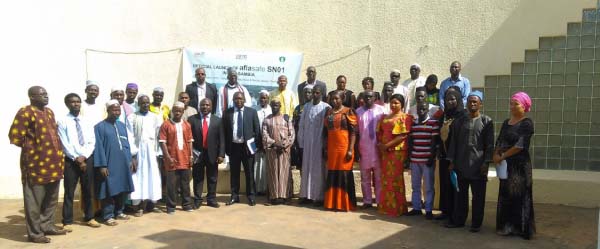
The
Food Security and Quality Authority (FSQA) in collaboration with the
International Institute of Tropical Agriculture (IITA) over the weekend
launched the Aflasafe SN01 in The Gambia, at a ceremony held at the Ocean Bay
Hotel in Cape Point, Bakau.
Aflasafe
SN01 is a bio-control product that reduces the contamination of aflatoxins in
groundnut and maize.
Aflatoxin
is a poison produced by the soil-inhabiting fungus Aspergillus flavus that
infects crops in the field, leading to post harvest losses, common in human
food and animal feed.
Aflatoxin
can occur throughout the food value chain, compromising food security, health
and trade.
Speaking
at the launching ceremony, Abdou Konlambigue, managing director of Aflasafe
Technology Transfer and Commercialization Programme at the International
Institute of Tropical Agriculture (IITA), said aflatoxin is not a Gambian
problem alone.
“Aflatoxin causes an estimated 5-30 per cent
of liver cancer worldwide, the highest incidence being in Africa (30%)”.
He
congratulated The Gambia for taking the lead in addressing the public health
and competitiveness challenges created by aflatoxins.
He
added that The Gambia has recently developed and validated the National
Aflatoxin Control and Investment Plan (NACAIP), and with the support of the
partnership for Aflatoxins Control in Africa would like to contribute to
achieving the objectives of this plan.
IITA
is a not-for-profit institution that generates agricultural innovations to meet
Africa’s most pressing challenges of hunger, malnutrition, poverty, and natural
resource degradation.
Mr
Konlambigue added that they worked with various partners across sub-Saharan
Africa.
“We
improve livelihoods, enhance food and nutrition security, increase employment,
and preserve natural resource integrity”.
“This
5-year project is slated to be used in 500,000 ha in 11 countries where
aflasafe is already a nationally registered product or is likely to be
registered soon.”
They
are Burkina Faso, The Gambia, Ghana, Kenya, Malawi, Mozambique, Nigeria,
Senegal, Tanzania, Uganda and Zambia.
The
goal is to contribute to improving food safety and increasing the income of
smallholder maize and groundnut farmers, through the use of aflasafe.
Sait
Drammeh PS ministry of Agriculture in Banjul said the aflatoxin challenge
continues to have a negative impact on Gambia’s groundnut export, to a point
that they are no longer able to export high-value aflatoxin-safe edible
groundnuts to international markets that offer premium prices.
Mr
Drammeh added that the launch of Aflasafe SN01 comes at a time when The Gambia
is ready to address the issue of aflatoxin as a whole.
“We
want our farmers to benefit from the effects of reducing aflatoxin on
groundnuts, resulting in the opening of the international market to our exports.”
The
government looks forward to working closely with the IITA, FSPMC, PACA, FSQA
and other stakeholders to achieve the desired outcomes in the fight against
aflatoxin, Drammeh added.



